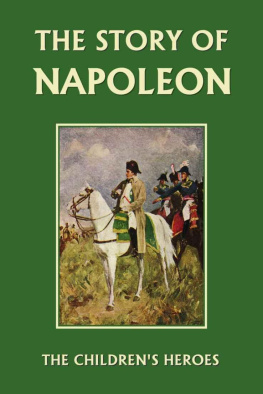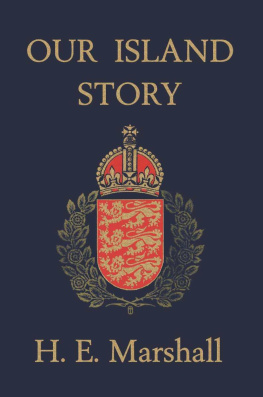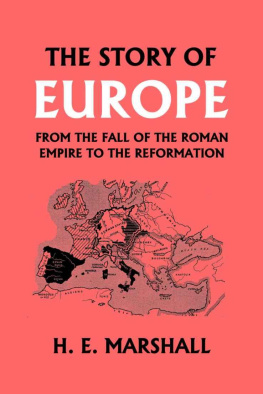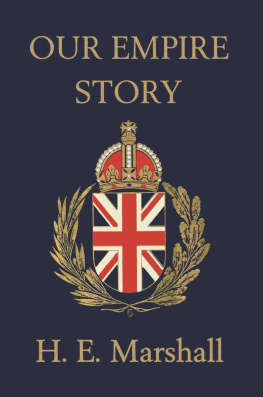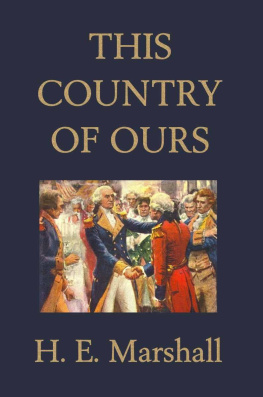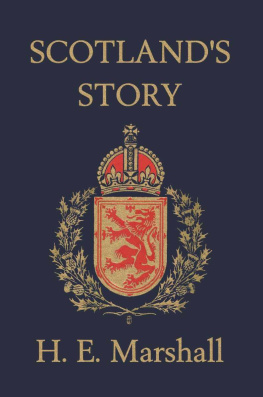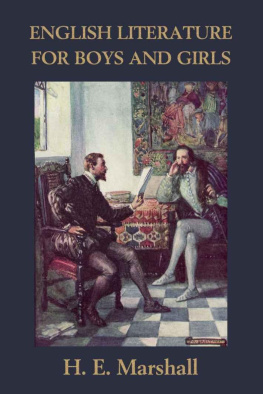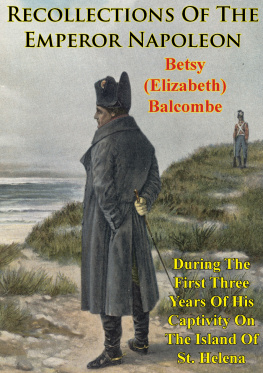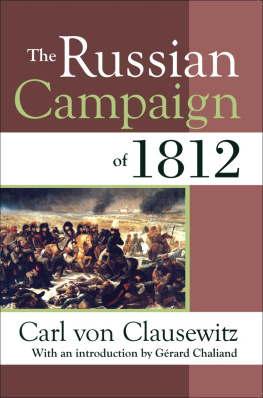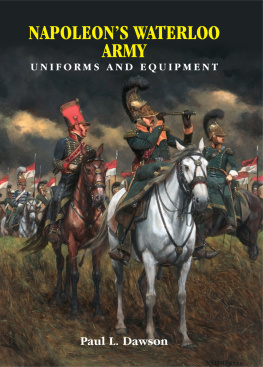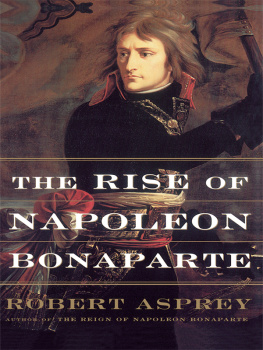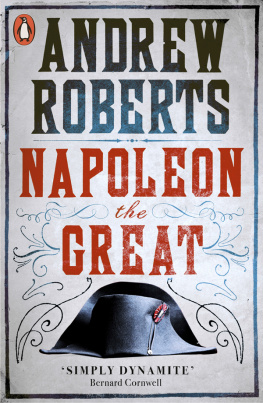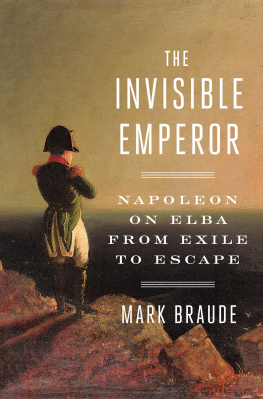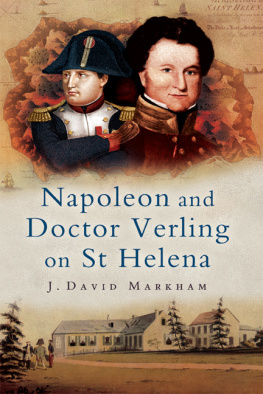The Story of Napoleon
by
Henrietta Elizabeth Marshall
Yesterday's Classics
Chapel Hill, North Carolina
Cover and Arrangement 2010 Yesterday's Classics, LLC
All rights reserved. No part of this book may be reproduced or retransmitted in any form or by any means without the written permission of the publisher.
This edition, first published in 2010 by Yesterday's Classics, an imprint of Yesterday's Classics, LLC, is an unabridged republication of the work originally published by T. C. & E. C. Jack Ltd. in 1908. This title is available in a print edition (ISBN 978-1-59915-214-1).
Yesterday's Classics, LLC
PO Box 3418
Chapel Hill, NC 27515
Yesterday's Classics
Yesterday's Classics republishes classic books for children from the golden age of children's literature, the era from 1880 to 1920. Many of our titles are offered in high-quality paperback editions, with text cast in modern easy-to-read type for today's readers. The illustrations from the original volumes are included except in those few cases where the quality of the original images is too low to make their reproduction feasible. Unless specified otherwise, color illustrations in the original volumes are rendered in black and white in our print editions.
Preface
Each of us bears about within him a dark, strange room, through the closed doors of which none but himself and God may pass to see and know what lies therein. With some the room is small, and much is left without for all the world to see and know. With some the room is very large, shutting in perchance the whole true man. And when we meet with such an one, and ask ourselves if he be great or little, good or bad, we must, if we be honest, say "I know not, for I cannot understand."
Such was the great Napoleon. The strange dark room he bore within was very large. And though there be many who hold aloft a flaming torch, and cry, "Come, follow me, and I will show to you what lay in that dark place," in smoke and flare the light dies out, the darkness seems yet darker, and we know as little.
So, if you ask me is this Napoleon a true hero, I say, Godwho alone has seen and knows what lay in that dark roomGod knows.
Contents
CHAPTER I
Napoleon at School
T O the south of Europe there is a sunny blue sea called the Mediterranean.
In this sunny, blue sea about fifty miles from the coast of Italy lies the island of Corsica, a rugged and beautiful little island, full of mountains. Its people are hardy and brave, and, like all mountain peoples, they love liberty. But for hundreds of years the island belonged to the Republic of Genoa. The people hated to be ruled by Genoa, and at last, under a leader called Paoli, they rebelled and fought for freedomfought indeed so well that they nearly drove the Genoese out. Then the Genoese asked the French to help them, and at last, tired of the struggle, they sold the island to France.
At that the Corsicans were very angry. What right had the Genoese to sell them like cattle to a new master? they asked. So they went on fighting the French, as they had fought the Genoese.
Among those who fought were Charles-Marie Bonaparte and his brave wife, Letizia. Bonaparte was an Italian, but for many years his family had lived in Corsica. He was a noble; but in Corsica there was little difference between nobles and shepherdsthey were all poor and proud alike. Letizia was young and beautiful, yet she bore all the hardships of war bravely. She followed her husband even to the battle-field. She was often in danger from flying bullets, yet she feared nothing, and thought only of the safety of her husband and the freedom of her country. By mountain paths, steep and narrow; through trackless forests, called in Corsica, "maquis"; over streams where there were no bridges, Letizia followed her husband. She was only a girl, but she had the heart of a hero, and not until the struggle proved hopeless did she give in.
For France was great and Corsica little, and brave though the people were, they were at last forced to yield; their island became part of the French dominion, and their leader Paoli fled over the seas.
And here, in this little isle, almost before the roar of battle had ceased, among a people full of sullen anger and bitterness against their conquerors, one blazing August day in 1769 a little son was born to Charles and Letizia Bonaparte. They gave him the name of Napoleon, a name which he was to make famous all the world over, and for all time to come.
Napoleon had several brothers and sisters, and their mother, having only one servant, had little time to look after the children. So she gave them a big, empty room in which to play. The walls and floor of this room were bare, and there was nothing in it except the children's toys. Here they were allowed to do as they liked. They scribbled and drew pictures on the walls, and played at all sorts of games. Napoleon always drew soldiers marching to battle, and he played with nothing but a drum and a wooden sword. He used to get up battles, too, amongst the boys of the neighbourhood. The wars would last for months at a time, during which there would be many fierce fights, surprises, and assaults. Napoleon was always leader, and made the others obey him. He was afraid of no one, and he bit, scratched, and slapped any one, big or little, as he chose. He was often noisy and quarrelsome, and bullied his brothers and sisters, especially Joseph, who was older than he.
But at times, even when he was a very small boy, he would be moody and. thoughtful, and would walk about by himself, refusing to speak or play with the others. He was an untidy little boy, not caring in the least how he was dressed. Straight dark hair straggled over his brown face, his stockings hung down over his shoe-tops, and altogether he must have looked a wild little harum-scarum.
When Napoleon was about five years old he was sent to a school for little girls kept by nuns. But he did snot stay long there and was soon sent to a boys' school, with his brother Joseph. Here the boys in class were set opposite each other in two rows, each under a large flag. One was the flag of Carthage, the other the flag of Rome, with S.P.Q.R. upon it, which means "Senatus Populusque Romanus." That is Latin for "The Senate and People of Rome."
The boys were arranged like this so that each side might try to learn better than the other, and fight and conquer in lessons, as the Romans and Carthaginians fought in war.
As Napoleon was the younger of the two brothers, he was put on the side of Carthage. But he did not like that at all, for in history he knew the Romans had always been the conquerors, and he liked to be on the winning side. So Joseph, who did not mind so much, changed with Napoleon, and allowed him to be a Roman.
Napoleon loved soldiers better than anything else and he longed to be one. Every morning, before he went to school, he was given a piece of white bread. This he used to give to a soldier in exchange for a piece of coarse brown bread. His mother was not very pleased at this. "Why do you give away your good white bread for a piece of brown?" she asked him one day.
"Because," replied Napoleon, "if I am going to be a soldier I must get used to eating soldiers' bread. Besides, I like it."
As he loved soldiers so much, his father and mother decided that he should be one. And one December day a little ship sailed away from Corsica, carrying Charles Bonaparte and his two sons, Joseph and Napoleon, over the sea to France. Napoleon was not yet ten, and Joseph scarcely a year older. He was going to learn to be a priest, and Napoleon to be a soldier.

